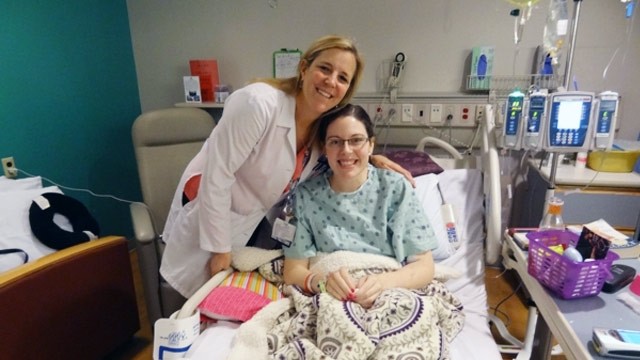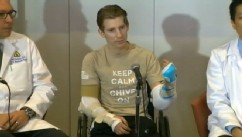Food started to bother Allison Sarver when she was 18 years old, giving her attacks of nausea and pain after meals. By the time she was 24, she would sneak out of her office after lunch to lie down in her car until the attacks passed. By the end of that year, she was no longer able to eat or drink anything and had to rely on intravenous feeding to survive.
After years of alternately ignoring the symptoms and getting misdiagnosed with ailments such as irritable bowel syndrome, a doctor in Philadelphia finally told Sarver she had chronic pancreatitis, meaning her pancreas -- the organ that produces insulin and other enzymes necessary for digestion -- had become scarred and enflamed. Unable to eat without pain, Sarver lost 30 pounds in two months and was found to be deficient in vitamins A, B, D and E.
While grateful for a diagnosis, getting treatment for her pancreatitis remained another matter. "I was told, 'If we can't help you, no one else can help you,'" she said, referring to her team of doctors. "I thought, 'There has to be a place that does [treats] this.'"
An Internet search led Sarver to the pancreas clinic at Johns Hopkins Hospital in Baltimore, which specialized in pancreatitis.
They had been performing a surgery on some of their patients that involved removing the entire pancreas, extracting its insulin-producing cells -- called islets -- and moving them to the patient's liver. The liver would then take over the job of producing insulin to regulate blood glucose levels, and the patient would take enzyme pills to fulfill the pancreas's remaining jobs, which include aiding in the digestion of fats, carbohydrates and protein.
In April 2012, when Sarver first started seeing the Hopkins doctors, she couldn't imagine having her entire pancreas removed. It was just too radical a procedure for her, she said.
As she alternated between broth diets, feeding tubes and intravenous nutrition over the next several months -- and still experienced pancreatic attacks and other complications -- Sarver waffled between ignoring her ailment to panicking about it. On a drive to visit her sister at Pennsylvania State University one weekend, Sarver had to undergo an emergency operation because her intestines wrapped around her feeding tube and caused a hernia. Other emergency room visits were simply because she couldn't weather the pain of pancreatitis attacks at home.
Sarver had to leave her job and eventually lost it entirely.
"I would snap into, 'Oh my gosh, what am I going to do?'" she said. "'My life has stopped.'"
Sarver's doctors performed surgery to remove her gallbladder, which sometimes alleviates pancreatitis, but it didn't work. That was when Sarver realized it was time for the surgery she had previously avoided. She didn't want to live another year, let alone the rest of her life, with chronic pancreatitis.
The surgery took eight hours and required her to stay at the hospital for 18 days in December 2012, but she says it was worth it.
"I feel like I've been given a gift, honestly," she said. "Another chance at life."
Less than two months after the surgery, Sarver plans to celebrate her 25th birthday on Sunday by eating cake. After progressing from broth to soft foods to stir fry to pizza, her only remaining hurdle is to reincorporate meat into her diet. The pain is gone.
"It's rare that you actually see the dramatic impact in quality of life as you do with this operation," said Dr. Martin Makary, the surgical director of the Pancreatic Islet Cell Autotransplantation Program at Hopkins. "We've seen people who go on to have normal lives – no pain – and go pack to eating food for the first time in years."
The causes of chronic pancreatitis are not fully understood, Makary said. Sometimes it can arise from alcohol abuse, but other times it can come from a rare scorpion sting. In many cases, like Sarver's, the cause is not known.
"A lot of these patients are told nothing can be done," Makary said. "They're ping-ponged from office to office, doctor to doctor. They're just given pain medication sometimes, but, of course, pain medication masks and doesn't treat the problem."





No comments:
Post a Comment